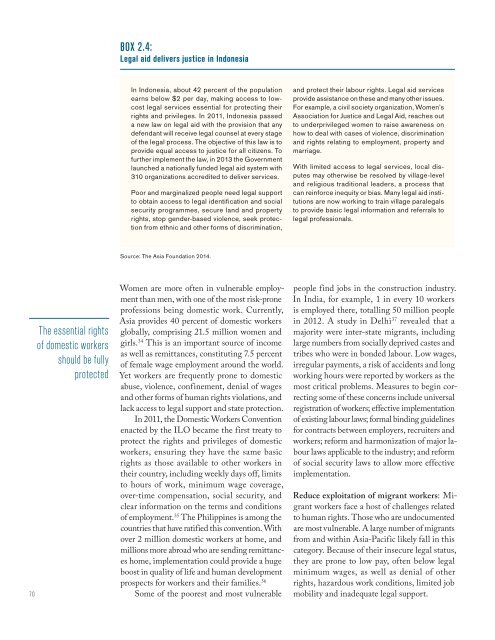SHAPING THE FUTURE HOW CHANGING DEMOGRAPHICS CAN POWER HUMAN DEVELOPMENT
1VPo4Vw
1VPo4Vw
You also want an ePaper? Increase the reach of your titles
YUMPU automatically turns print PDFs into web optimized ePapers that Google loves.
BOX 2.4:<br />
Legal aid delivers justice in Indonesia<br />
In Indonesia, about 42 percent of the population<br />
earns below $2 per day, making access to lowcost<br />
legal services essential for protecting their<br />
rights and privileges. In 2011, Indonesia passed<br />
a new law on legal aid with the provision that any<br />
defendant will receive legal counsel at every stage<br />
of the legal process. The objective of this law is to<br />
provide equal access to justice for all citizens. To<br />
further implement the law, in 2013 the Government<br />
launched a nationally funded legal aid system with<br />
310 organizations accredited to deliver services.<br />
Poor and marginalized people need legal support<br />
to obtain access to legal identification and social<br />
security programmes, secure land and property<br />
rights, stop gender-based violence, seek protection<br />
from ethnic and other forms of discrimination,<br />
and protect their labour rights. Legal aid services<br />
provide assistance on these and many other issues.<br />
For example, a civil society organization, Women’s<br />
Association for Justice and Legal Aid, reaches out<br />
to underprivileged women to raise awareness on<br />
how to deal with cases of violence, discrimination<br />
and rights relating to employment, property and<br />
marriage.<br />
With limited access to legal services, local disputes<br />
may otherwise be resolved by village-level<br />
and religious traditional leaders, a process that<br />
can reinforce inequity or bias. Many legal aid institutions<br />
are now working to train village paralegals<br />
to provide basic legal information and referrals to<br />
legal professionals.<br />
Source: The Asia Foundation 2014.<br />
70<br />
The essential rights<br />
of domestic workers<br />
should be fully<br />
protected<br />
Women are more often in vulnerable employment<br />
than men, with one of the most risk-prone<br />
professions being domestic work. Currently,<br />
Asia provides 40 percent of domestic workers<br />
globally, comprising 21.5 million women and<br />
girls. 34 This is an important source of income<br />
as well as remittances, constituting 7.5 percent<br />
of female wage employment around the world.<br />
Yet workers are frequently prone to domestic<br />
abuse, violence, confinement, denial of wages<br />
and other forms of human rights violations, and<br />
lack access to legal support and state protection.<br />
In 2011, the Domestic Workers Convention<br />
enacted by the ILO became the first treaty to<br />
protect the rights and privileges of domestic<br />
workers, ensuring they have the same basic<br />
rights as those available to other workers in<br />
their country, including weekly days off, limits<br />
to hours of work, minimum wage coverage,<br />
over-time compensation, social security, and<br />
clear information on the terms and conditions<br />
of employment. 35 The Philippines is among the<br />
countries that have ratified this convention. With<br />
over 2 million domestic workers at home, and<br />
millions more abroad who are sending remittances<br />
home, implementation could provide a huge<br />
boost in quality of life and human development<br />
prospects for workers and their families. 36<br />
Some of the poorest and most vulnerable<br />
people find jobs in the construction industry.<br />
In India, for example, 1 in every 10 workers<br />
is employed there, totalling 50 million people<br />
in 2012. A study in Delhi 37 revealed that a<br />
majority were inter-state migrants, including<br />
large numbers from socially deprived castes and<br />
tribes who were in bonded labour. Low wages,<br />
irregular payments, a risk of accidents and long<br />
working hours were reported by workers as the<br />
most critical problems. Measures to begin correcting<br />
some of these concerns include universal<br />
registration of workers; effective implementation<br />
of existing labour laws; formal binding guidelines<br />
for contracts between employers, recruiters and<br />
workers; reform and harmonization of major labour<br />
laws applicable to the industry; and reform<br />
of social security laws to allow more effective<br />
implementation.<br />
Reduce exploitation of migrant workers: Migrant<br />
workers face a host of challenges related<br />
to human rights. Those who are undocumented<br />
are most vulnerable. A large number of migrants<br />
from and within Asia-Pacific likely fall in this<br />
category. Because of their insecure legal status,<br />
they are prone to low pay, often below legal<br />
minimum wages, as well as denial of other<br />
rights, hazardous work conditions, limited job<br />
mobility and inadequate legal support.


